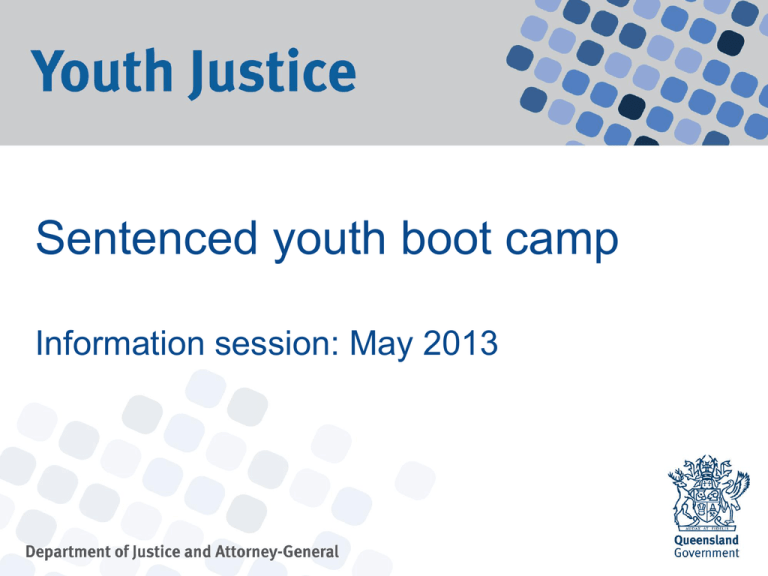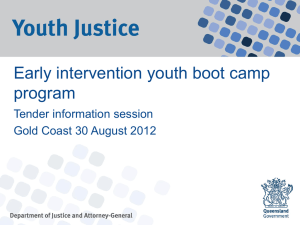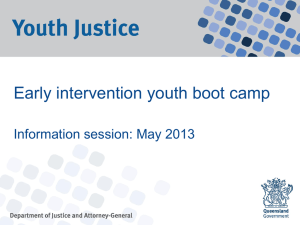Background - Department of Justice and Attorney
advertisement

Sentenced youth boot camp Information session: May 2013 Outline of session This presentation will cover the following: • Background • Program objectives • Target group • Referral pathway • Features of service delivery • Service delivery responsibilities • Requirements for funding eligibility • Key budget areas • Key dates/milestones Background • The Queensland Government made an election commitment as part of its Safer Streets Crime Action Plan to trial boot camps for young people. • On 24 March 2013, Cabinet endorsed an expansion of the youth boot camp trial to three further locations: • early intervention youth boot camps in Rockhampton and on the Fraser Coast/Sunshine Coast; and • a sentenced youth boot camp in Townsville. Background Program development • Review of international literature • Ministerial Round Table • Written submissions • Meetings with existing boot camp service providers. Background Key messages from literature Research has demonstrated that youth boot camps will be most effective if they: • provide structure, discipline and physical activity • use physical activities to change attitudes and negative self perceptions • address the causes of crime • continuation of the program on return to the community. Background Key messages from consultation • Underpinned by integrated case management framework • Involve ‘in community’ programs and mentoring • Involve family members • Be evidence-based • Reflect the specific needs of Aboriginal and Torres Strait Islander young people. Background Key messages from consultation continued… • use the time young people are removed from the community constructively • target young people before they become entrenched in the criminal justice system • respond to the specific needs of females • exclude young people who may place participants at risk • ensure the program is evaluated. Background Two youth boot camp models developed: • Early Intervention Youth Boot Camp (EIYBC) • Targeting young people before they are entrenched in the criminal justice system. • Two year trials at three sites: Gold Coast, Fraser/Sunshine Coast and Rockhampton involving 40 participants in each location. • Sentenced Youth Boot Camp (SYBC) • Targeting young people facing a detention sentence. • Two year trial at two sites: Cairns and Townsville involving 40 participants in each location. Objectives of SYBC Key objectives • Reduce re-offending • Improve community safety • provide an intensive consequence for offending Other important objectives • develop discipline and respect • engage in education, training and/or employment • provide community reparation • strengthen cultural identity and connection to communities Target group and location • Young offenders aged 13–17 years at direct risk of being sentenced to a period of detention. • Aboriginal and Torres Strait Islander young people will make up a significant proportion of the target group. • Referrals can be made by any court in relation to young people who are residents of Townsville Local Government Area, including north to Ingham, south to Burdekin, west to Hughenden, Palm Island. • The residential camp does not need to be located within the catchment area. Target group Key issues common to the target group: • • • • • • pro-criminal attitudes and beliefs dependency on illegal drugs and/or alcohol high risk of re-offending poor parental monitoring and supervision family conflict leading to homelessness association and identification with peers with anti-social attitudes • medium to long-term disengagement from education, training and/or employment. Referral pathway • The Youth Justice Act 1992 has been amended with new sentencing options to support the trial of the SYBC. • The aims of this sentencing option will be to divert young offenders from detention, increase community safety and provide an intensive consequence for offending. • The Townsville Youth Justice Service will work with the SYBC provider to assess possible referrals prior to sentence. • Trial target: 20 young people per year. Features of service delivery Program phases • residential camp • community supervision • mentoring. Residential Camp • Young people will attend a residential camp for the first month of their boot camp order. • This is where the SYBC structured day will commence. • The structured day may include participation in a number of program components from 8:30am – 5pm every day. Features of service delivery Conditions of the residential camp • Must not be located in an urban location • 24 hour, 7 day per week supervision and curfew • All program components must be delivered at the residential camp for the duration of the first month. Residential capacity: up to five young people at a time. Features of service delivery Considerations – residential camp • Ensures the safety and security of the local community • Ensures the safety of staff and participants • Access to critical incident responses with police and emergency services • Community consultation to occur before establishment • Identification and management of risks to the program Features of service delivery Community supervision • After the completion of the one month residential camp phase, the young person will return to their community. • The structured day and supervision will continue in the community for the remainder of the boot camp order. Mentoring • Introduced during residential camp phase and continues during community supervision phase. • Option of continuing a voluntary mentoring relationship after the completion of their youth justice order. Features of service delivery Where possible program components should be delivered across the residential and community supervision phases. Program may include: •intensive physical activity/experiential learning •Family responsibility •cognitive behavioural training •education, training and employment •mental health services •community reparation •mentoring. Features of service delivery Intensive physical activity/experiential learning Purpose • Instil discipline in the young person, enhance their physical health and enable the identification of the causes of the young person’s offending. What might be delivered? • Challenging physical activities and experiential learning in outdoor settings Features of service delivery Family responsibility Purpose • Strengthen the young person’s family and parents’ capacity to supervise and maintain boundaries on their child. What might be delivered? • Family skilling programs are shown to be effective in the promotion of supervision, discipline, and respectful communication between young people and their families. Features of service delivery Cognitive behavioural training Purpose • Identify and address behaviours linked to the young person’s involvement in crime. What will be delivered? • Evidence-based cognitive behavioural programs Aggression Replacement Training (ART) and Changing Habits and Reaching Targets (CHART) • Provided by Youth Justice Services. Features of service delivery Education, training and employment Purpose • Assist young people participate in education, training and/or employment. What might be delivered? • Activities to support work/education readiness, placement and support into flexible education, training and employment. • Transition to employment or vocational training at the completion of the order Features of service delivery Health services Purpose • Identify and address any health issues including alcohol and drug use and mental health issues that may be directly or indirectly contributing to offending behaviour. What might be delivered? • Health assessments and interventions including those responding to substance use and mental health issues. Features of service delivery Community reparation Purpose • Provide a direct consequence for the young person’s offending behaviour, facilitate their ability to establish work habits, develop positive attitudes by helping others. What might be delivered? • Involvement in projects that give back to the community. This may include maintaining public sites, sorting recycling items for charities, meals on wheels and graffiti removal. Features of service delivery Mentoring Purpose • Guide, encourage and support young people through a structured and trusting relationship. What might be delivered? • Mentors may be volunteers from the community. A mentoring network may be established to deliver mentoring activities. Program delivery Statutory case management and integration • Youth Justice Services will develop case plans in consultation with the service provider to meet the needs of the court. • Case plans will form the basis of structured daily activities. • Structured daily activities will be developed and delivered by the service provider. • If necessary a working group will be formed to support program integration and implementation. Program delivery Program coordination and delivery • The service provider will coordinate the SYBC program including administration of structured days in the residential camp and in the community. • The service provider may choose to deliver all components themselves or subcontract elements of the service. • The service should be seamless to the participants. Requirements for funding eligibility • Establish that service provider is financially and organisationally viable • have no outstanding financial accountability, service delivery or performance issues for funding previously provided by the Queensland Government • hold public liability and other relevant insurance (or provide plans to obtain insurance) • provide evidence that the organisation has the capacity to deliver and sustain the service required. Requirements for funding eligibility Recommendations for submissions: • address all selection criteria with appropriate detail • provide evidence to support each claim by the service provider and/or subcontracted service provider. • include evidence that the organisation can meet performance targets. Selection of service provider Written submissions will be assessed on • How well selection criteria is answered and supporting evidence • Eligibility criteria • Ability to meet performance targets and outcomes for young people and families • Proposed budget and value for money Key budgetary considerations • Funds will be provided across a two year period. • Budgets should include an itemised annual budget for each year of the trial. • Service providers are asked to create cost-efficiencies where possible. Performance and evaluation • Service providers report quarterly on performance measures • A process and outcome evaluation will be undertaken to assess the trial. • Data collection will be required of the service provider to contribute to the evaluation Key dates/milestones • Funding submissions close: 21 June 2013 • Attorney-General announcement of funded service provider: 19 July 2013 • Service delivery commences: September 2013 or before Further information • For tender documentation please go to http://www.justice.qld.gov.au/youth-justice/youth-bootcamps-general-information • Please send any queries regarding the Expression of Interest Information Paper or Submission Form to youthbootcamps@justice.qld.gov.au and a departmental representative will respond. • Questions?









